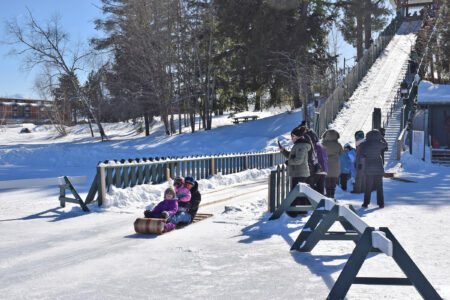Canadians’ opinions of US near historic lows
WATERTOWN — Five years ago, Canadians viewed Communist China as the country that posed the top threat to their own. Now, a majority see the U.S. as the most threatening.
That’s one of the findings in a new Pew Research Center study titled, “Canadians’ Opinions of the U.S. and its President Are at Near or Historic Lows.”
Their country’s threat view is among findings of PRC’s survey of 1,024 Canadian adults conducted from Feb. 19 to April 15. The survey was taken as Canadian Prime Minister Mark Carney took office and after U.S. President Donald Trump announced initial tariffs against Canada, China and Mexico.
In his acceptance speech in late April, Carney said, “As I’ve been warned, America wants our land, our resources, our water, our country. But these are not idle threats. President Trump is trying to break us so that America can own us. That will never ever happen.”
On Sunday, Canadian essayist and novelist Stephen Marche wrote in a New York Times opinion piece: ” In response to America’s threats, Canada is in the middle of the greatest explosion of nationalism in the country’s history, far more substantial than the nationalism of the 1960s.”
Such talk has been followed by actions. For example, Ogdensburg-Prescott International Bridge crossings totaled 37,377 for June 2025, down 37.93% from 60,219 for the same month in 2019. The OBPA uses 2019 as a benchmark for the last “normal” year of traffic prior to the pandemic.
Auto crossings dropped 41.21% to 31,618 in June from 53,785 in June 2019. Much of that total includes discretionary day trip and vacation travelers. In June 2024, there were 54,174 auto crossings, a difference of 30% from the same month this year.
Meanwhile, shoppers north of the border have been urged to “Buy Canadian,” instead of U.S. products.
Pew Research Center has been polling Canadians on their views of the U.S. for two decades; the latest data puts the opinions at historic lows.
Some findings of the survey:
¯ A majority of Canadians, 59%, name the U.S. as their country’s top threat. PRC reports that most Canadians who say this perceive the U.S. as a great deal of a threat to their country’s economy (77%) and 53% say it’s a great deal of a threat to their national security.
¯ When asked about Trump’s personal characteristics, 91% of Canadians described him as arrogant, compared with 14% who said the same about President Joe Biden during his first year in office.
¯ About a third of Canadians (34%) have a favorable opinion of the U.S. today, down 20% since last year.
¯ Across all ideological groups, the share of Canadians with a favorable view of the U.S. has dropped by about 15% or more since last year.
¯ More than half (54%) of Canadians say the U.S. is the world’s leading economy the highest figure recorded since PRC started asking the question in 2009.
Corey C. Fram, director of the Thousands Islands International Tourism Council, believes the current state of affairs between the U.S. and Canada won’t be improving in the immediate future.
“I think we are going to see some spillover beyond this year,” Fram said on Tuesday. “When you look at the factors that are driving it, the significant piece is the rhetoric around Canadian sovereignty coming out of Washington, D.C. It’s unlikely that the administration’s policies are going to change in regards to tariffs.”
Another factor that may be keeping Canadian visitations to the American side of the Thousand Islands low, Fram said, is the monetary exchange rate.
As of Tuesday, that rate reflected that the Canadian dollar was worth 73 cents in American funds.
“We’ve been in kind of a status quo on that for some number of years,” Fram said. “It’s improved slightly and it looks like it’s going to probably improve around the end of the year, but not making any sort of marked improvement.”
Fram has hit the road in Canada to tout the American side of the Thousand Islands. “I’ve gone to Toronto and met with journalists, including the editor of the travel and features section of the Globe & Mail,” he said. “And then the paper sent a reporter to visit the Thousand Islands Ontario and New York in one trip. That’s something that had to be pitched: ‘Come and see for yourself what the experience is like.’ That’s the work we put in, and we’re going to continue to do it.”
But the Tourism Council may have its work cut out for it.
“I think the challenges we are facing about Canadian sentiment toward U.S. visitation are stronger than something that is easily corrected with a marketing campaign,” Fram said. “The factors that are driving that negative sentiment are beyond our control. Those factors are going to have to improve. We can only counter those feelings so much.”
He added, “It’s an interesting time. We are in a period where the discourse is so combative that even highlighting data that is solid and verifiable brings biased reactions and preconceived notions to it.”




